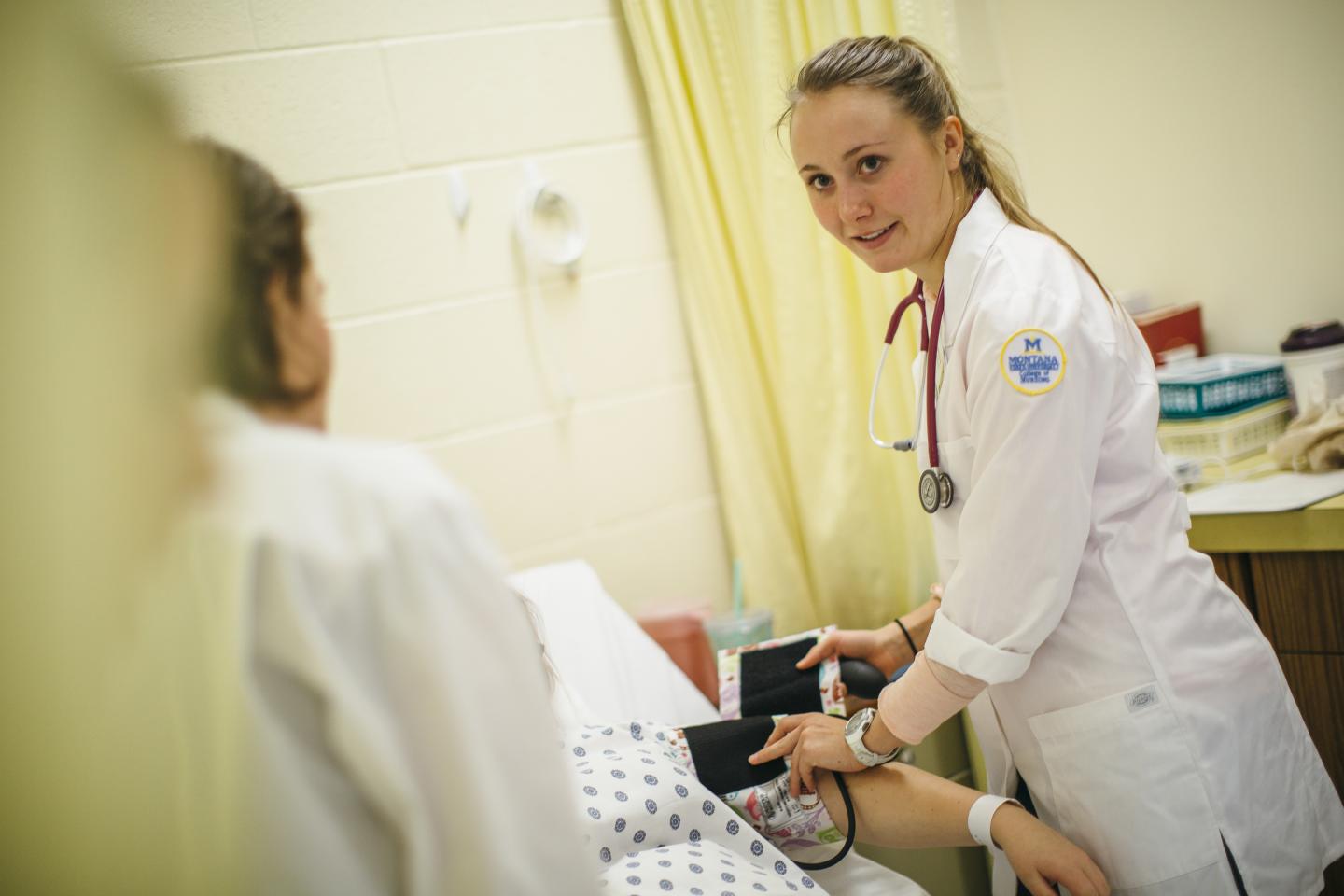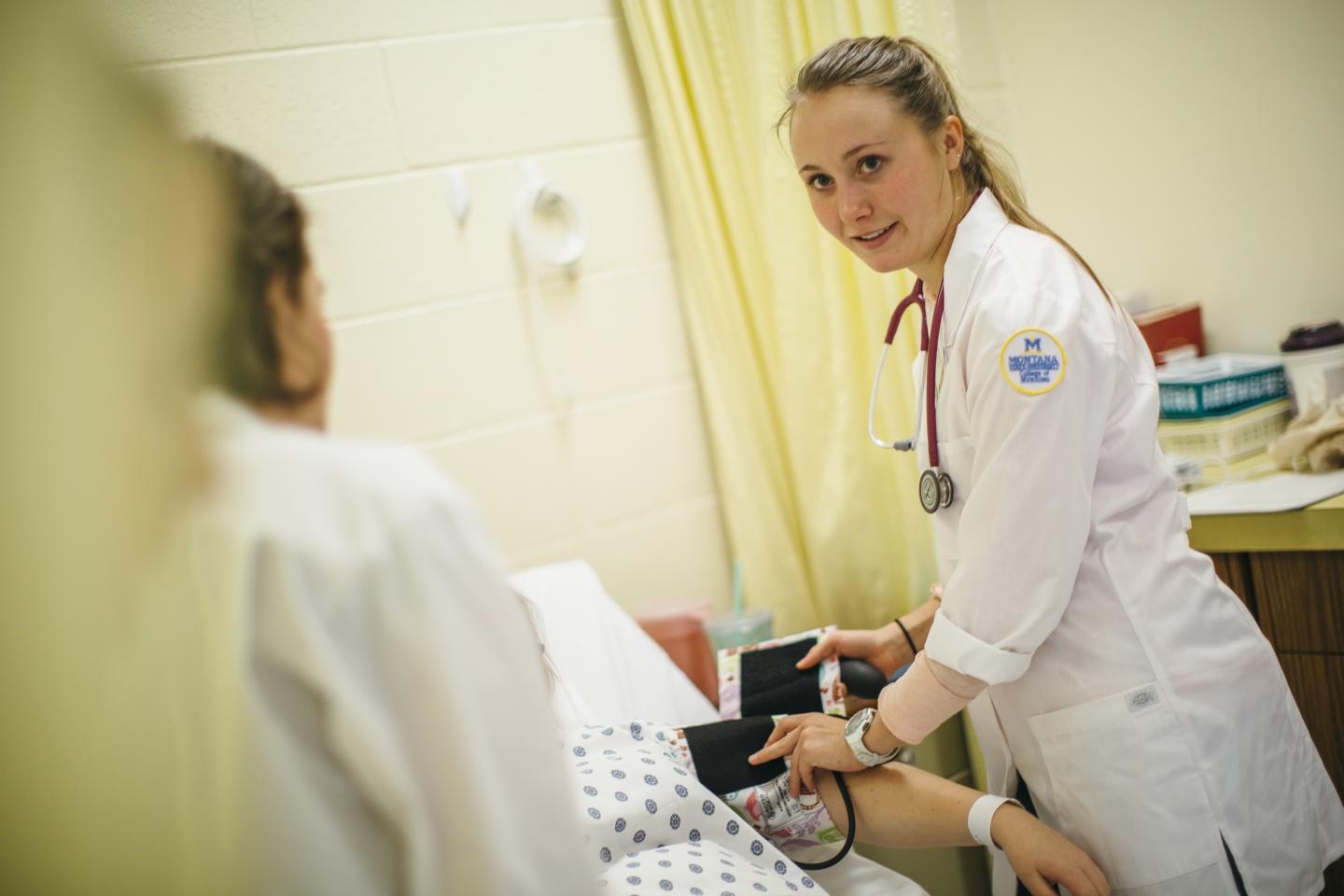
Credit: MSU Photo by Adrian Sanchez-Gonzalez
Montana State University's College of Nursing has received a grant totaling nearly $2.8 million that will enable MSU and its partners from across Montana to address the need for nurses in shortage areas across the state, particularly in rural areas. The four-year grant, which begins July 1 and is worth nearly $700,000 per year, is from the U.S. Health Resources Services Administration.
The goal of the project is to prepare MSU College of Nursing students to practice in community-based primary care settings, according to Sarah Shannon, dean of the College of Nursing and the grant's principal investigator. In addition to nursing students, the project will also provide professional development opportunities to current registered nurses around working in team-based settings, implementing care coordination systems and improving health in their communities.
Where people obtain health care is changing, said Shannon, who noted that health care is shifting away from acute care settings, or hospitals, to primary and community-based settings. In turn, the shift is bringing change to nursing practice and nursing education.
"Nurses play a key role in preventing and managing chronic disease, including behavioral health such as depression," Shannon said. "Nurses in primary care practices can increase access to the type of care people need to manage their health and stay healthy in their homes and communities."
The HRSA-funded project will also target recruitment of students from American Indian communities into the MSU College of Nursing and a new community-based primary care nursing track. To help those students succeed, a new retention specialist and two new nurse mentors based with MSU's Caring For Our Own Program – which aims to recruit and graduate American Indian/Alaska Natives nurses who will work primarily in reservation settings and, to a lesser degree, urban settings in Montana – will support the students.
The overall project is expected to work with more than 100 baccalaureate nursing students, 20 preceptors and mentors, 40 practicing nurses and 40 faculty members, according to Shannon.
"In a transforming health care environment, nurses play a key role in their communities, working in clinics and organizations that focus on keeping people healthy and active," said Kris Juliar, director of Montana Area Health Education Center and Office of Rural Health, who helped write the grant. "Health care organizations need nurses who can manage complex health care environments, engage teams, improve quality and document that the care is resulting in better outcomes for patients and their families. This project is designed to focus on the skills nurses need for these high-quality health care settings."
Juliar said that over time, the project should have a positive impact on access to primary care in medically underserved communities, culturally appropriate primary care for Montana's American Indian and Alaska Native populations and improved health outcomes for Montana's rural and underserved populations. Major partners include the Caring For Our Own Program, Area Health Education Center, Rocky Mountain Tribal Epidemiology Center, Fort Peck Health Promotion Disease Prevention Initiative, Rocky Mountain Public Health Training Center, Mountain Pacific Quality Health, and Montana Primary Care Association, Juliar said.
With five campus locations in Billings, Great Falls, Kalispell, Missoula and Bozeman, the MSU College of Nursing is well-positioned to work with its training and education partners, Shannon said. That work includes recruiting primary care-oriented undergraduate nursing students committed to practicing in non-institutional settings in medically underserved areas; providing clinical training experiences for undergraduate nursing students in community-based primary care settings; delivering continuing professional development to preceptors, mentors and practicing nurses; enhancing didactic and clinical training curricula to assure that the MSU nursing curriculum integrates primary care, chronic disease prevention and control, quality/outcomes, adverse childhood events, population health, interprofessional education, mental health and substance abuse; and providing a full-time partnership facilitator to serve as a liaison between the college and its clinical partners.
###
Media Contact
Sarah Shannon
[email protected]
406-994-3784
@montanastate?lang=en
http://www.montana.edu
Original Source
http://www.montana.edu/news/17836





